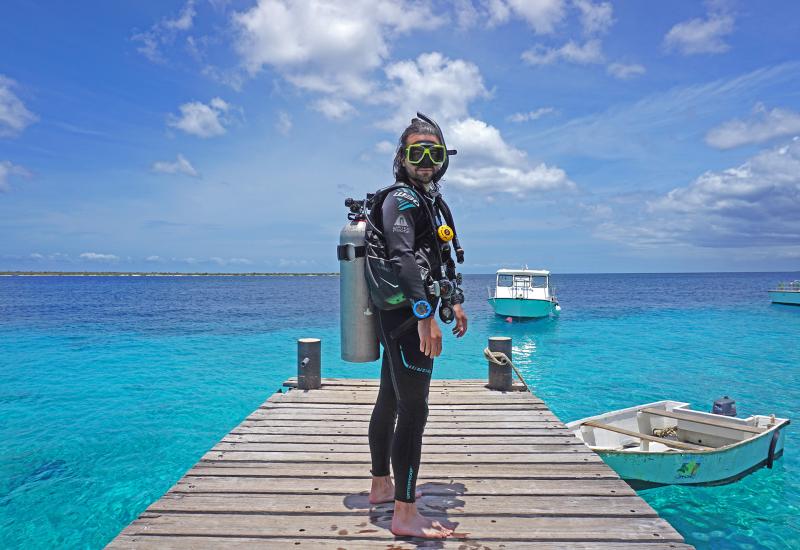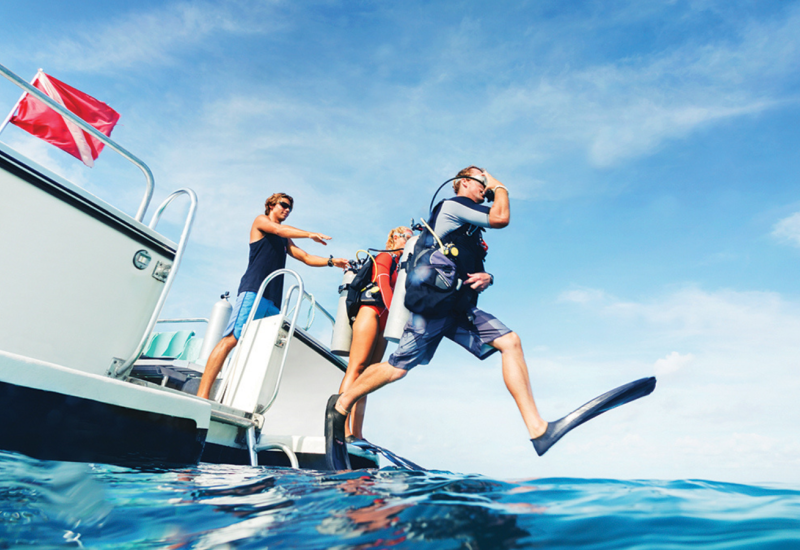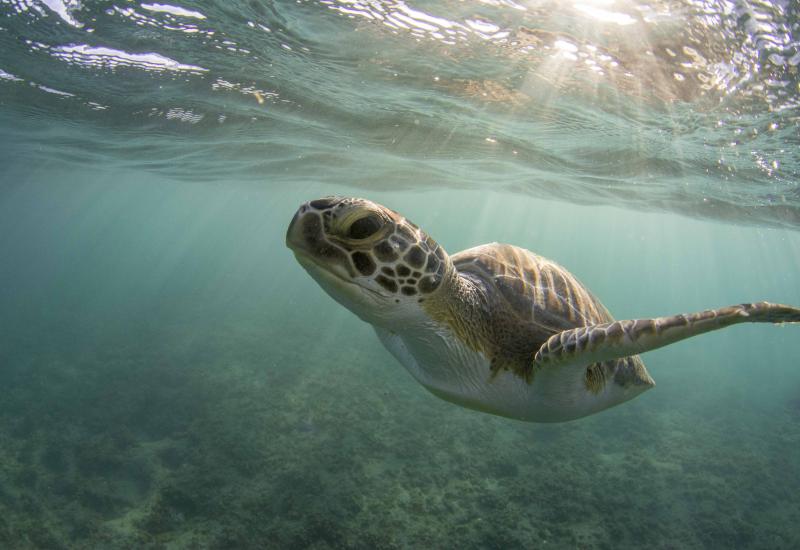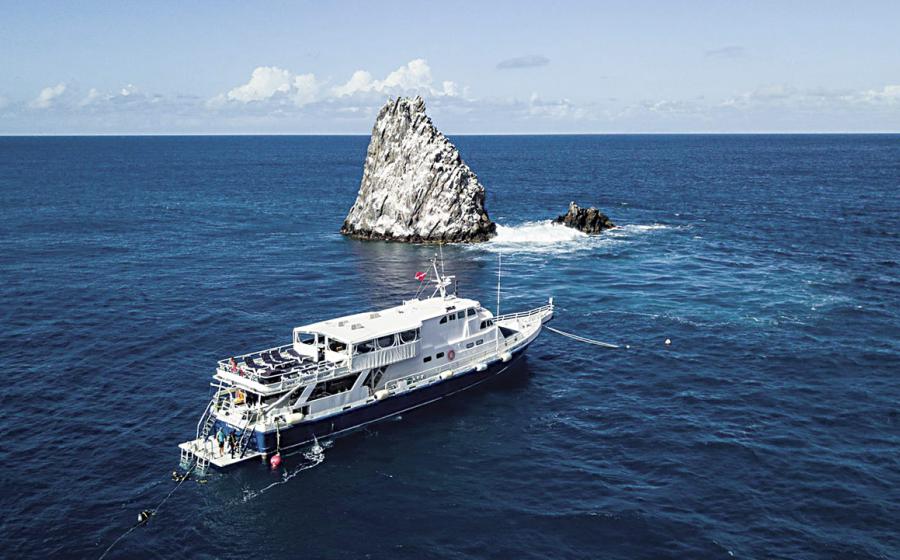Talk The Talk
June 2007
Here's the insider's guide to some of the more confusing bits of dive speak. After all, you may be a newbie (see below), but you don't have to sound like one.
BC
Buoyancy compensator, or that life preserver-looking thing that divers wear. When properly weighted, inflating it makes you buoyant, deflating it makes you sink.
Bootie
|||
|---|---|
|  |
|
Dive footwear made of neoprene usually worn under open-heel fins to help keep your feet warm, prevent chafing and protect your feet when diving from shore. Unnecessary when wearing full-foot fins. And yes, its joke potential is seemingly limitless.
Deco
Short for decompression, as in no-decompression limit, or as long as you can stay underwater without being required to make a decompression stop.
C-card
Stands for certification card, your license to kill some bottom time. This credit card-sized photo ID tells dive operators you're good to go and ready to dive. To get one, you'll need to pass open-water certification (see definition). Also good for bragging rights at the bar.
Defog
|||
|---|---|
|  |
|
A solution that when applied to your mask, helps keep it free of fog during a dive.
Checkout dives
|||
|---|---|
|  |
|
The graduation walk, so to speak, of your basic dive training. You dive as an equal with your instructor and demonstrate what you've learned so he can sign off on your C-card (see below). No matter what you do in your diving career, you'll always remember these four dives.
DAN
|||
|---|---|
|  |
|
Stands for Divers Alert Network, a nonprofit organization affiliated with the Duke University Medical Center. By joining, you help promote dive safety, and you get a discount on dive insurance--specialized coverage against in-water injuries and travel mishaps. DAN is one of a handful of companies that offer dive insurance; another is DiveAssure.
Instructor/Divemaster/Master Diver
An instructor is a specially trained teacher of diving who's at the top of the scuba food chain. A divemaster is a professional in-water guide who leads dive tours of reefs and wrecks. Finally, a master diver is a recreational diver who has completed a demanding schedule of advanced training courses and demonstrated a high level of proficiency at diving.
Newbie or noob
A term of endearment for divers in training or newly certified divers. If you don't want to be called one, make sure you dive a lot.
Pool
A reference to any body of water you're about to dive in, whether it's a pond, lake or the Pacific Ocean. Example: "That completes my dive briefing, the pool is now open."
Open-water certification
The official term for dive lessons. Open-water certification is like Scuba 101--it covers everything you need to know to be a basic diver. Upon completion, you'll be a card-carrying member of the club (see "C-card").
Rinse tank
A tank of fresh water where divers rinse their gear at the end of their dive day and exaggerate the size of the marine life they saw.
Resort course
Scuba with training wheels, but a great introduction to the sport. Typically offered by hotels and resorts as a half- or one-day poolside activity. You'll get a quick overview, then suit up and give it a go in highly supervised, controlled conditions.
Tank or scuba cylinder
A pressurized aluminum or steel cylinder containing a diver's breathing gas--usually compressed air, or something relatively close.
Fins
|||
|---|---|
|  |
|
Duck-like appendages you strap to your feet to make you more fish-like. Never, ever call them flippers.
Split fins
A relatively new type of fin in which a split runs a majority of the length down the blade. Proponents say they make your kick more efficient, while critics say they look silly. Please don't try to make your own by sawing your fins in half.
Six pack
|||
|---|---|
|  |
|
We're not talking about abs--a six pack in dive-speak refers to a small boat that only holds roughly six divers. It's also some divers' apres-dive cocktail of choice, which definitely won't give you six-pack abs.
Live-aboard
|||
|---|---|
|  |
|
A dive vessel that remains at sea for several nights in order to maximize your time near to the best dive sites. You eat, sleep and dive from it (in some cases you actually dive from one of its small tenders)--literally, you live aboard the boat.
Safety sausage
|||
|---|---|
|  |
|
A long inflatable tube used to get the attention of people on the boat you're diving from so they can pick you up after a dive. It also serves as a prop for many off-color jokes aboard the dive boat and around the rinse tank.
Vis
|||
|---|---|
|  |
|
Dive slang for visibility, a measure of how far you're able to see underwater given water conditions and how much you've had to drink the night before.
Regulator
|||
|---|---|
|  |
|
The device you breathe from under water.
Spare air
|||
|---|---|
|  |
|
A small tank of compressed air some divers carry in case their primary tank and regulator go south.
Giant stride & backroll
|||
|---|---|
|  |
|
Two ways of getting into the water in your dive gear. A giant stride is an exaggerated step into the water from a vessel's platform or a dock. A backroll entry is a tank-first fall off the side of a boat. Good news--you'll never belly flop while scuba diving.
Octopus
|||
|---|---|
|  |
|
ou in a headlock. It's also a term for the backup regulator that's attached to your tank in case you need to share air with someone (the object of this game is never to use it).
June 2007
Here's the insider's guide to some of the more confusing bits of dive speak. After all, you may be a newbie (see below), but you don't have to sound like one.
BC
Buoyancy compensator, or that life preserver-looking thing that divers wear. When properly weighted, inflating it makes you buoyant, deflating it makes you sink.
Bootie
||| |---|---|
|| | |
Deco
Short for decompression, as in no-decompression limit, or as long as you can stay underwater without being required to make a decompression stop.
C-card
Stands for certification card, your license to kill some bottom time. This credit card-sized photo ID tells dive operators you're good to go and ready to dive. To get one, you'll need to pass open-water certification (see definition). Also good for bragging rights at the bar.
Defog
||| |---|---|
|| | |
Checkout dives
||| |---|---|
|| | |
DAN
||| |---|---|
|| | |
Instructor/Divemaster/Master Diver
An instructor is a specially trained teacher of diving who's at the top of the scuba food chain. A divemaster is a professional in-water guide who leads dive tours of reefs and wrecks. Finally, a master diver is a recreational diver who has completed a demanding schedule of advanced training courses and demonstrated a high level of proficiency at diving.
Newbie or noob
A term of endearment for divers in training or newly certified divers. If you don't want to be called one, make sure you dive a lot.
Pool
A reference to any body of water you're about to dive in, whether it's a pond, lake or the Pacific Ocean. Example: "That completes my dive briefing, the pool is now open."
Open-water certification
The official term for dive lessons. Open-water certification is like Scuba 101--it covers everything you need to know to be a basic diver. Upon completion, you'll be a card-carrying member of the club (see "C-card").
Rinse tank
A tank of fresh water where divers rinse their gear at the end of their dive day and exaggerate the size of the marine life they saw.
Resort course
Scuba with training wheels, but a great introduction to the sport. Typically offered by hotels and resorts as a half- or one-day poolside activity. You'll get a quick overview, then suit up and give it a go in highly supervised, controlled conditions.
Tank or scuba cylinder
A pressurized aluminum or steel cylinder containing a diver's breathing gas--usually compressed air, or something relatively close.
Fins
||| |---|---|
|| | |
Six pack
||| |---|---|
|| | |
Live-aboard
||| |---|---|
|| | |
Safety sausage
||| |---|---|
|| | |
Vis
||| |---|---|
|| | |
Regulator
||| |---|---|
|| | |
Spare air
||| |---|---|
|| | |
Giant stride & backroll
||| |---|---|
|| | |
Octopus
||| |---|---|
|| | |










